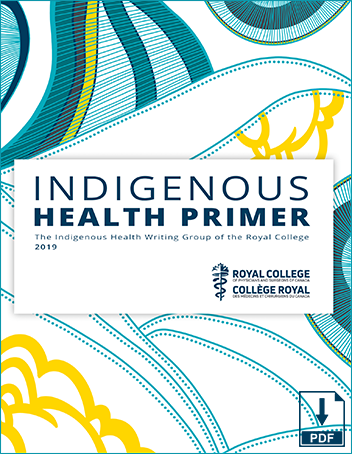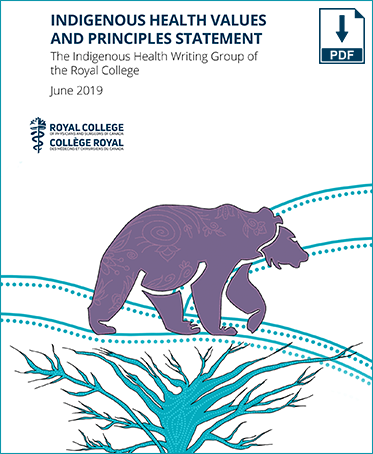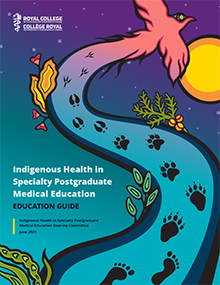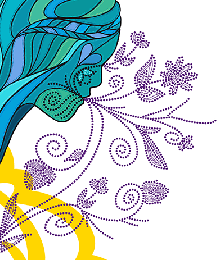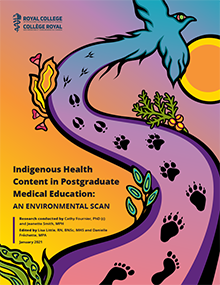INDIGENOUS HEALTH
The Office of Indigenous Health drives our commitment to Reconciliation in medical education.
Our goal is to:
- embed Indigenous health education (history, cultural safety) into all residency training programs
- national assessment of Indigenous health into postgraduate medical education (PGME) curriculum; and
- provide resources for practising specialists to incorporate into their practice.
MEET THE TEAM
Sherry Sandy, director
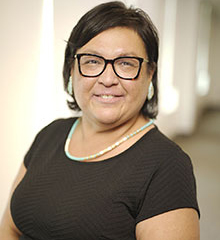
Sherry Sandy is the director, Office of Indigenous Health. Sherry had a decade of experience in progressively senior positions with a track record of accomplishments in Indigenous Health, program development, partnership, and collaboration building. She has a Bachelor in Social Work from McMaster University and Master of Social Work from Wilfrid Laurier University.
Karhinéhtha' / Cortney Clark, program manager
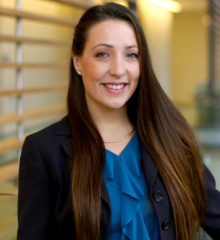
Karhinéhtha' / Cortney Clark brings an integrated portfolio of experience as an Indigenous health researcher and consultant. She serves as an Associate Chair for the National Consortium for Indigenous Medical Education. Cortney is a Doctor of Science candidate in Rehabilitation and Health Leadership (DSc RHL) at Queen’s University.
Rebekah Eatmon, BHK, MD, CCFP – clinician educator, Assessment
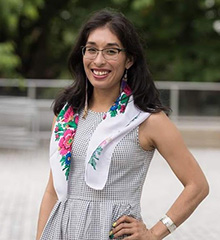
Rebekah Eatmon, MD, CCFP is an Indigenous family physician serving both urban and rural Indigenous peoples. She is Tsimshian from Lax Kw’alaams, from the Raven Clan on her father’s side and Métis on her mother’s side. She works for Lu’ma Medical Centre in Vancouver, as well as Carrier Sekani Family Services in remote communities in BC, where she is proud to deliver culturally safe care to her patients.
Ryan Giroux, MD, FRCPC – clinician educator, Standards
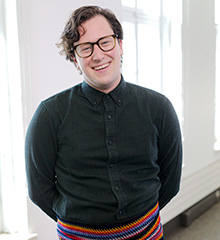
Ryan Giroux is a general pediatrician working at St. Michael’s Hospital and the Inner City Health Associates in Toronto. He is Métis from the Métis Nation of Alberta as well as mixed settler heritage. His work at the Royal College focuses on accreditation. Ryan is the Temerty Faculty of Medicine’s PGME Indigenous Health Lead. Ryan’s interests include Indigenous child health, refugee and newcomer health, LGBTQ2S+ health, and medical education.
Joel Voth, MD, CCFP (AM) – clinician educator, Curriculum
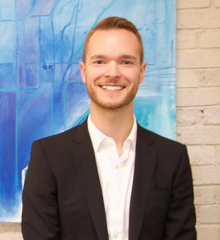
Dr. Joel Voth has a background in Family Medicine and also completed a fellowship in Addiction Medicine during his training. Dr. Voth is a proud member of the Métis Nation of Manitoba and LGBTQ+ community and comes to medicine with a commitment to reduce health disparities for populations that are denied opportunities to meaningfully participate in the health system. Dr. Voth currently provides care for patients who use substances in both inpatient and outpatient settings through Michael Garron Hospital and the Inner City Health Associates (ICHA) in Toronto.
INDIGENOUS HEALTH COMMITTEE
The Indigenous Health Committee (IHC) is an independent body that comprises Indigenous physicians, scholars and other health-care professionals, who work with the Royal College to develop accessible educational resources for specialists.
Members
- Lisa Richardson, MD, FRCPC
- Kona Williams, MD, FRCPC
- Albert Dumont, Elder
- Marcia Anderson, MD, FRCPC
- Margo Greenwood, PhD, MA, BEd
- Mae Katt
- Louise Simard
- Vince Tookenay, MD
- Sarah Funnell, MD, FRCPC
- Amanda Fontes, MD (resident)
- Sarah de Leeuw, PhD, MA, BFA
- Scott Murray
- Ryan Giroux, MD, FRCPC
- Rebekah Eatmon, BHK, MD, CCFP
- Sherry Sandy
- Cortney Clark
- Joel Voth, MD, CCFP (AM)
TOOLS AND RESOURCES
Indigenous Health Education Workshop - Foundations
This ready-to-teach, interactive workshop provides the foundational information on Indigenous health and history in Canada that residents and practising physicians need to become culturally safe practitioners. This includes the impacts of ongoing colonization and colonial systems on the health of Indigenous Peoples. It is expected that all workshop participants will take it upon themselves to learn more.
Length: 120 – 180 minutes
Note: The Indigenous Health Foundations workshop helps institutions and programs meet upcoming General Standards of Accreditation standards regarding equity, diversity and inclusion (EDI).
This workshop is also a step towards fulfilling the Truth and Reconciliation Commission’s Calls to Action, particularly those that focus on ensuring health care providers nurture and demonstrate cultural safety in medical education and practice.
Download the workshop content:
- Facilitator Guide
- PowerPoint Slide Deck
- Pre-Workshop Activities (for participants)
- Indigenous Health Vignettes
- Workshop Evaluation Survey (for participants)
- Workshop Evaluation Survey (for facilitators)
MOC Credits
- Participation in Section 1 unaccredited group learning activities = 0.5 credit per hour of participation (50 credits maximum per cycle).
- Pre-reading activity is eligible for credits in the MOC Program under Section 2: Reading an article (1 credit per article). In order to claim credit, you must record the activity in your MAINPORT ePortfolio and complete all the required fields, including at least one (1) learning outcome.
Note: Resident Affiliates can accumulate credits during residency that can be applied to their continuing professional development (CPD) requirements following certification.
For workshop FACILITATORS:
The following can be claimed under the current MOC framework for facilitators and instructors.
- SECTION 2: Learning acquired while preparing or researching for your teaching sessions or presentations may be reported under Section 2 as a personal learning project (PLP).
- SECTION 3: Assessment - Feedback on Teaching: You may calculate the time spent receiving, reviewing and reflecting as part of your activity submission and you will receive 3 credits per hour.
Videos
Watch the following short videos to learn from Elder Albert Dumont.
Elder Albert Dumont on Land and Indigenous Health:
Elder Albert Dumont on Indigenous Peoples and the Healthcare Experience:
Foundational Reading
Learn essential knowledge about Indigenous health in this rich compendium including case studies of Indigenous experiences and insights from Indigenous Fellows.
(Earn MOC Program credits for each foundational reading document above: Two (2) credits per hour, Section 2 Self-learning: Planned learning: Personal Learning Project)
Indigenous Health Values and Principles Statement, Second Edition
Learn about the health values important to Indigenous People and how the CanMEDS framework relates to them with actionable principles that guide culturally safe health care.
Guidance documents
Specialty Matters podcast - The Importance of Land
How can physicians create a truly meaningful territorial acknowledgement? Elder Albert Dumont offers teachings.
Specialty Matters podcast - Embracing a Strengths-Based Approach
Why it's important to reframe how specialists communicate with Indigenous Peoples to a positive approach. Ryan Giroux, MD, FRCPC offers practical tips.
Indigenous health in specialty postgraduate medical education guide
The Indigenous health in specialty postgraduate medical education guide responds directly to faculties of medicine looking to enhance Indigenous health curricula and programming.
Cultural safety guidance for clinicians during the COVID-19 pandemic
Health care professionals: increase your knowledge on why and how to follow culturally safe practices when treating patients with this one-page public health guide.
(MOC Program credits: One (1) credit per article, Section 2 Self-learning: Scanning: Reading a journal article)
Indigenous health content in postgraduate medical education: An environmental scan
Read about the “state of readiness” of the 17 faculties of medicine in Canada to integrate Indigenous health in postgraduate medical education curriculum and programming.
Online Courses
Earn MOC Program credits for the following courses: Three (3) credits per hour, Section 3 Knowledge assessment: Accredited self-assessment programs
San’yas Indigenous Cultural Safety Training
Develop understanding and promote positive partnerships between clinicians and Indigenous People. Although developed in British Columbia, the learning benefits are transferrable. San’yas Indigenous Cultural Safety Training
Ontario Indigenous Cultural Safety Program (developed in collaboration with San’yas Cultural Safety Training)
Improve health care experiences and outcomes by increasing respect and understanding of the unique history and current realities of Indigenous communities.
Ontario Indigenous Cultural Safety Program
RESOURCES
